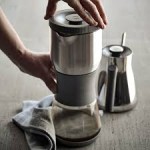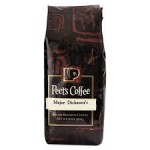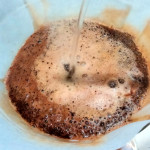I admit I was surprised when the highly regarded Fellow coffee maker manufacturer posted this on their site. I was surprised mostly because it was both innovative and, upon reflection, largely true. Roasted coffee freshness is an elephant-in-the-room issue in the coffee business. Through much of the industry there’s a lot of emphasis on grinding fresh, but that presupposes beans that are fresh, and mostly they aren’t.
 Since “old” is in this case a euphemism for “stale” I feel it’s a good time to share what I know or at least think about freshness and its successor, staleness. I’d also like to address their recommendations in future articles, but let’s start with freshness and how to keep coffee from getting stale. Most supermarket coffee, even in bean form, is by industry standards, stale. That is, it has been two or more weeks since it was roasted. According to industry experts, coffee should kept in bean form until just before using, but even then, its peak flavor lasts roughly ten to fourteen days from roast.
Since “old” is in this case a euphemism for “stale” I feel it’s a good time to share what I know or at least think about freshness and its successor, staleness. I’d also like to address their recommendations in future articles, but let’s start with freshness and how to keep coffee from getting stale. Most supermarket coffee, even in bean form, is by industry standards, stale. That is, it has been two or more weeks since it was roasted. According to industry experts, coffee should kept in bean form until just before using, but even then, its peak flavor lasts roughly ten to fourteen days from roast.
For most of the large roasters and many consumers, this is a market impossibility. The supermarket distribution system alone makes it highly unlikely that much coffee is being purchased, let alone brewed within this time frame. One of the exceptions might be Peet’s, who in my observation, seems to lead the industry in its scrupulous overseeing its supermarket slots. My mother is a Peet’s fan, and I often pop into a mass supermarket chain to snare her beans. Peet’s scrupulously stamps roast dates on its packages, while many roasters succumb to supermarket pressure to post “best by” dates, which are definitely not the same. Some best-by dates euphemistically project a year of freshness. Careful packaging which includes nitrogen flushing to drive away oxygen and that little one-way valve added to the package work to help prolong freshness, but no one has ever claimed they “freeze” the staling process, although some of my industry friends claim they are pretty happy with the results. 
Speaking of freezing, the late roaster/inventor Michael Sivetz once told me his future vision of coffee being sold in the freezer section. Needless to say, this has not yet happened and many in the industry scoff at freezing beans. Nonetheless, I have done many anecdotal samplings using Sivetz’ recommendations and found freezing to be a no-brainer better solution compared to any alternate storage method past the two week window. The more I’ve sought to intermix my snooty connoisseur instincts with the solid practicality of a socially and fiscally responsible citizen, the more appealing freezing has become. Put in plain language, it can’t help the rain forest to have a bunch of coffee snobs tossing out three-week-old beans.
How can you tell if the beans you’re grinding are fresh? The most reliable indicator that is not entirely subjective is to grind and brew some coffee. If the beans still have what I’ll call “life” in them, they will foam up as you first pour hot water over the grounds, in either an automatic or manual coffee maker. This denotes the presence of carbon dioxide. I’ve seen roasters find some coffee laying around unmarked by a date on its package and brew a small batch. After they saw no foaming, they simply pronounced it “dead” and tossed it out.
Speaking of roasters, in my experience, most of my friends who roast are not ideal guides to dealing with preserving freshness or how to use stale coffee to its best advantage. Simply, it’s like asking a wine merchant how to best utilize cheap bottles of wine. Why on earth would they take home cheap bottles, when they have discount (free?) access to the best ones? Most roasters simply take home a small amount of today’s roasted coffee for tomorrow morning’s home brewing. They also likely pay little or nothing for them, so if there’s any question, they can afford to toss them out. So, you really need to find others like myself who are stuck with buyer’s remorse and stale beans on occasion and must learn to struggle to make them work, which is why Fellow’s post is so noble and why they just might know something. 
I have presupposed that most of our readers own a grinder and buy only beans. Frankly, pre-ground coffee is often the best ground coffee – that is, no matter which home grinder you own, it is unlikely to grind as authoritatively or meet specs as rigidly as does any commercially ground coffee from a major coffee company. In a perfect world (I can dream can’t I?) coffee would be pre-ground and packaged so perfectly as to figuratively freeze its attributes. From my subjective tastings, the most knowledgeable company in the world regarding packaging pre-ground coffee is Illy. They do a lot of R&D on packaging and if anyone could really claim to rival home ground fresh coffee with their pre-ground canned versions, I think it would be them. However, they really focus on a select market which is too limited to satisfy my appetite to drink coffee from various small farms around the world, which is the hobby of so many of us.
I hope to post more about this subject as I more thoroughly study and digest the Fellow article’s recommendations. Stay tuned.
Podcast: Play in new window | Download


Hi Kevin
I purchase three pounds of coffee to get free shipping and home delivery. I struggle to keep it fresh, since I use a pound every ten days or so. Should I freeze what I am not using? Would I be better of buying one bag at a time from a local roaster? I am in NYC, so there is no shortage of great coffee that I can pick up at their shops. Trouble is that is less convenient than home delivery.
Hi Jay, I do the same. A great example is Oren’s Daily Roast, who offer free shipping on three pounds. Yet, I hate to waste coffee or settle for brewing with stale beans. This is the number one example of something consumers face. Yes, I totally agree with freezing. To do this, I place two of the pounds in its own freezer bag. In fact I double bag them. I have not noticed any real taste difference, certainly none compared to leaving them at room temperature and letting them go stale. I simply scoop out enough beans to brew and grind them. In fact, I would say there’s a benefit to grinding frozen beans, as they are more brittle, an ideal state for grinding.
I know some in the coffee business who say it’s not a good idea, but have never heard one single evidence close to scientific about it, only subjective speculations.
Yes, go ahead. Freeze them.
Warm regards,
Kevin
Thanks Kevin
I purchase my beans from Oren’s and do the three pound order. On another note, what happened to the Ottomatic review.? I don’t recall seeing it. I only brew with the Ottomatic.
Currently, I am using. Breville Smart Grinder Pro. Its advantage for me is ease of maintenence and no counter mess. I only brew Chemex in the Ottomatic. Are there better grinders? I did not find the Virtuoso easy to maintain and the slits on the bottom leave a counter mess. I also had trouble with the silicone gasket on the virtuoso.
BTW, I find Oren’s to be very good with great customer service.
Thanks
Jay
Hi Jay,
I’m a big Oren’s fan as well. The Ottomatic sample I had was a prototype. This is one time being first in line didn’t work well. I’m still waiting for a replacement abut apparently sales have been so robust they have not been able to supply a review sample. It’s okay with me, but I thought I should just be open about it.
Re: grinders. I have had pretty good luck with the Virtuoso, but others complain about its lack of micro-adjustments. The new Sette has lots of adjustments and I’m almost done reviewing it. I’ve heard good things about the Breville, but no review samples ever came.
What the Chemex needs most is a grinder that does a coarse grind well. That’s a rarity. I use an ancient, but still very functional Ditting KF 804. Although it is a flat-disc grinder, it does a good grind even out to Chemex coarseness with minimal fines. the fines, pan or powder that is akin to chaff, adds a lot of unnecessary bittterness to coffee. Finding a grinder that does coarse grinds with minimal pan.
Warmly,
Kevin
I must be drinking stale coffee!! I order a case of it from Cafe Du Monde in New Orleans (I am in Las Vegas) and it usually lasts me a year. Unfortunately they do not come in bean form.
Hi Keith,
We all drink plenty of so-called stale coffee. Coffee oxidizes quickly. It’s not as if it’s unhealthy or even unpleasant. It’s just that the freshest coffee grows on you when you sample it over a period of time. The most important part you’re already doing. You’re freshly brewing it. Then freshly ground becomes an enlightened step. Finally, from freshly roasted beans becomes a goal. For roasters, they must even keep an eye on green beans they are roasting, which have their own shelf life. Freshness is at each step a kind of effervescence that becomes a very positive sought-after trait. Recently, I had coffee at various homes over the holidays. I enjoyed them all. But, very few were fresh from that perspective.
Warm regards,
Kevin
hello
I like your blog. i like coffee, i also work with coffee.
thanks